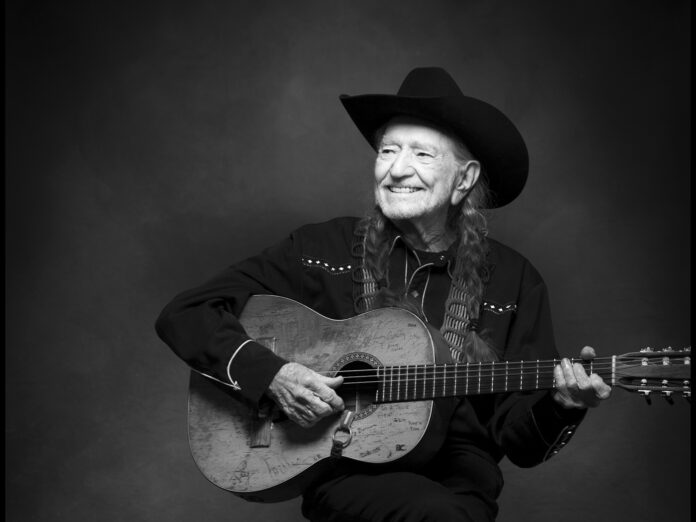It is already beyond serious argument that the string of tremendous albums issued by Willie Nelson during his eighties established a formidable benchmark in the admittedly little-contested field of octogenarian discographies. Having blown out 90 candles in April 2023, Nelson is now setting a daunting standard for future nonagenarians who fancy taking him on.
It is already beyond serious argument that the string of tremendous albums issued by Willie Nelson during his eighties established a formidable benchmark in the admittedly little-contested field of octogenarian discographies. Having blown out 90 candles in April 2023, Nelson is now setting a daunting standard for future nonagenarians who fancy taking him on.
JONI MITCHELL IS ON THE COVER OF THE NEW UNCUT – ORDER YOUR COPY HERE!
Just as last year’s Bluegrass was a deft reworking of a dozen of his own classics to make them sound even more like traditional standards than they already did, The Border further demonstrates that Nelson feels he no longer has time to faff around overmuch with titles – this is an album located where Texas abuts Mexico, and where the music of each overlap. The cover shows the ochre mesas of the Big Bend National Park, along the frontier.
The title and opening track is further unsubtle if effective scene-setting. “The Border”, borrowed from Rodney Crowell’s 2019 album Texas, channels the quiet desperation of a US Border Patrol officer, neither song nor its protagonist fishing for sympathy, merely relating that this is how things are (“I work on the border, and it’s workin’ on me”). It is smart writing, understanding that the view of any given political conundrum tends to get less clear the closer one gets to it, and Nelson does it abundant justice: his gruff grumble suits the narrator’s weary stoicism, and not for the last time on this album, those gnarled fingers wring flamenco-flavoured miracles from the fretboard of that battered, antique Martin. “The Border” is not Crowell’s only contribution – his 1989 hit “Many A Long And Lonesome Highway”, also appears, possibly by way of averting the crime against nature that would have been Willie Nelson neglecting to record a given song called “Many A Long And Lonesome Highway”.
Of the remaining eight tracks, four are new songs by Nelson and long-time collaborator Buddy Cannon, four by other composers. Though Nelson at this point possesses gravitas sufficient to make any song he sings sound like his own, care has been taken to find songs he can wear especially comfortably. The lovely Larry Cordle/Erin Emberlin cut “I Wrote This Song For You” is sung straight through the fourth wall in the style of Nelson’s own “Sad Songs & Waltzes” (“I hope you hear it on/Some lonely late-night radio”), though is significantly less vindictive. The Shawn Camp/Monty Holmes shuffle “Made In Texas” is a plausible new anthem for Nelson’s home state, though only Nelson’s deadpan drawl could locate so much double-edged nuance in the bumper-sticker zinger “You can always tell a Texan/But you can’t tell him much”.
“Hank’s Guitar”, by Cannon and Bobby Tomberlin, is a cousin to David Allan Coe’s “The Ride”, although the hallucination described in this lyric is not hitching a lift with the country patriarch, but being incarnated as his instrument (for all that Williams has loomed in country’s consciousness since his death in 1953, in a manner akin to an Old Testament prophet, it is extraordinary to contemplate that he and Nelson are near contemporaries: Williams was born only a decade earlier). The line “Next thing I knew/I was given to the Country Music Hall Of Fame” is an implicit acknowledgement of what awaits Trigger, Nelson’s famously dilapidated six-string.
Throughout his remarkably productive dotage, Nelson has sounded in no hurry for any such posthumous acclaim: the fatalistically entitled “Last Man Standing” is now six years and nine albums ago. The new songs on The Border are notably short on mordant acknowledgement that the Rio Grande is not the only liminal space inhabited by the record’s creator. “What If I’m Out Of My Mind” is a Buck Owens-esque swinger which wryly implies that old age need be no barrier to romantic misjudgement, and “Once Upon A Yesterday” a stately ballad fit to be ranked alongside any of Nelson’s formidable catalogue of stately ballads, iced with an exquisite steel solo by Bobby Terry.
The Border closes with a singularly spectacular defiance of any dying of the light. “How Much Does It Cost” is, more or less, Nelson’s companion to Leonard Cohen’s “Tower Of Song”, a rumination on his work and his reasons for doing it. But instead of asking Hank Williams how lonely it gets, Nelson cedes the key question to Woody Guthrie – “Ol’ Woody said how much does all of this cost/I’ll pay for it all, what the heck/And, by the way, take a cheque?” – before deciding that the answer now is the same as it was when his recording career began, back during the Eisenhower administration: “I’m a songwriter/And always will be”.
When you purchase through links on our site, we may earn an affiliate commission. Here’s how it works.



